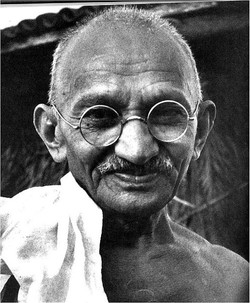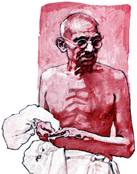Gandhi
Websites
The Complete Site on Mahatma Gandhi
"This comprehensive site is regularly updated & maintained by non-profit Gandhian Organizations in India & has a wealth of information & material for researchers, students, activists & anyone interested in Gandhi."
GandhiServe Foundation: Who's Gandhi?
"GandhiServe, a charitable foundation registered in Germany, aims to spread the ethics of nonviolence by disseminating information about and popularizing Mahatma Gandhi's life and works."
Includes recordings, photographs and video.
"Mahatma Gandhi" article by Edmund Candler
"Gandhi has awakened the national consciousness in a way that no other man could awaken it; at the same time, he has unloosed forces that he is unable to control."
The Atlantic Monthly, July 1, 1922
The Mahatma Gandhi Center for Global Nonviolence
"To promote justice and nonviolence through education, scholarship and engagement."
James Madison University
M. K. Gandhi Institute for Nonviolence
"The M.K. Gandhi Institute for Nonviolence is a nonprofit that works to realize the vision of its historic namesake."

There are five pages full of information, photos, and artwork that discuss the life of Gandhi. Mohandas Karamchand Gandhi,
his full name, was born in the town of Porbander in 1869. His life was taken from him on January 30, 1948. Gandhi's political awakening helped him to emerge as the leader of the Indian community. Gandhi first coined the term satyagraha to signify his theory and practice of non-violent resistance. Gandhi recorded the early years of his life in his autobiography, The Story of My Experiments With Truth.
Topic: Gandhi, Mahatma Language: English Lexile: 1050 Biography http://www.sscnet.ucla.edu
Mahatma Gandhi, the Missing Laureate
Gandhi is described as the strongest symbol of non-violence in the 20th century on this web site from the Nobel Prize Foundation. It may seem inconceivable to many that, although nominated five times, he was never awarded the honor of the Nobel Peace Prize. Readers will find information about some of the theories about why he never won. Each nomination is examined, and reasons are given why the honor was bestowed upon another candidate. Readers will find information about many of the social issues affecting the world at that time.
Topic: Gandhi, Mahatma Language: English Lexile: 1260 Biography http://www.nobelprize.org

Born into a Hindu merchant family, Gandhi learned about nonviolence from his mother. He also gained respect for other religious beliefs. As a lawyer in South Africa, he protested being forced to sit in third class on a train because of his color. He refused to register with the police for being Indian and was imprisoned. Reading Thoreau in jail, he began to develop his strategy of civil disobedience to fight injustice and discrimination. He used nonviolence in India to fight British rule, religious hatred, and the caste system. When nationalism turned to violence, he called for peaceful disobedience.
Topic: Gandhi, Mahatma, Civil disobedience Lexile: 1150 Biography http://www.crf-usa.org
Non-Violence
The essence of non-violent technique is that it seeks to liquidate antagonisms but not the antagonists.Gandhi
Non-violence is more than just avoiding violence. The goal is to convert your opponent to your way of thinking about oppression. Change is accomplished by winning the heart and mind of the opponent, and being willing to suffer for the sake of change. How can violence accomplish the goal of making the world a more peaceful place? Learn about the strategies used by nonviolent protesters. Study Gandi's principle of doing no harm, but using the truth force courageously. Gain a clearer understanding of how Gandhi instructed his followers in nonviolent resistance.
Topic: Nonviolence (Passive resistance), Gandhi, Mahatma Lexile: 1200 Biography http://www.bbc.co.uk
The Assassination of Mohandas Gandhi By James Michaels
United Press International celebrated one hundred years of journalistic excellence by featuring the stories of many peo-
ple and events that contributed to history. This particular story was written on January 30, 1948 after the assassination
of Monhandas Gandhi. The article reports on the shooting of the leader by a Hindu extremist. It includes descriptive and detailed writing of the tragedy that allows readers to connect to the event as if they were there. It goes into more detail about the reactions to the shooting and the aftermath as well.
Topic: Gandhi, Mahatma Language: English Lexile: 1190 News Source http://100years.upi.com
His work as a lawyer in the late 1800s in South Africa was where Gandhi most likely experienced his first taste of racial prejudice. Readers will learn about Gandhi's early work in South Africa assisting Indian merchants and how he first began his practice of nonviolent disobedience. This site also discusses other important demonstrations Gandhi led such as the Salt March. Readers will learn about Gandhi's early death at the hands of a fellow Hindu, and how his mission of independence was carried out.
Topic: Gandhi, Mahatma Language: English Lexile: 1320 Biography http://www.ppu.org.uk

- EResources
- Ebooks
- Contests and Opportunities
- Faculty Resources
- Library Good Reads
- GradPoint (opens in new window)
- LibGuides
- NHS Library Seminars (opens in new window)
-
Historical Links
- Immigrant Groups in the West
- Immigrant Groups in the West Making the Connections
- Immigration Symbols
- Immigration West
- Industrial Revolution Resources List
- Industrialists
- Korean War
- Legacy of Jim Crow
- The 60's
- Women and the Industrial Revolution
- Working Women and the Industrial Revolution
- Working Women During the Industrial Revolution
- Against Slavery
- Immigration
- Louis Braille An Exceptional Man
- MLA and APA Style Guides
- Norwood High School Home
- Quick reference
- Research & Instruction
- Summer Work
- Textbooks
This site provides information using PDF, visit this link to download the Adobe Acrobat Reader DC software.
